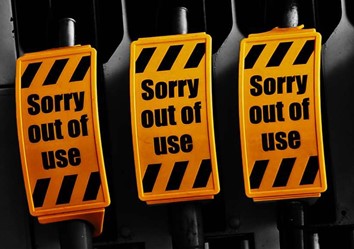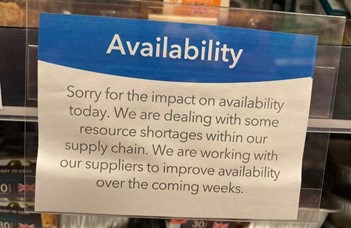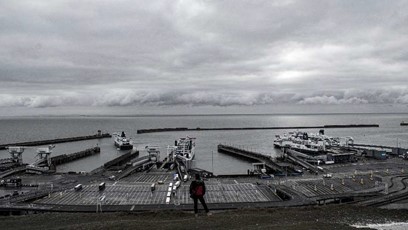writes Geography student Yusuke Yasuda
*The views in the following article are the personal views of the author and are not an official position of the School.*
I’m not sure whether this has a positive or negative connotation, but I have been experiencing the impact of supply chain (or ‘migrant issues’!) daily since I’ve come to the UK to study migration.
Part of my routine, since last September, has been watching local news programs every morning on YouTube. Many of which have been repeatedly reporting domestic supply chain problems, which has motivated me to grab my camera and pop to my local petrol station one day in October. Once there, I saw yellow signs on all petrol pumps saying ‘Sorry, out of use’. Cars were coming and going, with drivers looking more and more disappointed by the situation.
Signs on petrol pumps ©Yusuke Yasuda
On a different day around that period, I dropped by a supermarket on campus on a whim after class, only to find most shelves empty, with signs saying, ‘Sorry for the impact on availability today’. I couldn’t even purchase plain pasta or some juice. These are only a couple of examples of the supply chain problems UK faces these days.
A sign on an empty shelf ©Yusuke Yasuda
As far as I know, supply chain problems are deeply related to a lack of migrant workers caused post-Brexit which, combined with the COVID-19 pandemic, is only going to be getting worse. The country faces labour shortages, including lorry drivers, who deliver dairy necessities nationwide.
As one of the individuals affected by this unstable situation (and an international student), I wonder whether the current state of our society and economy are how Brexit supporters imagined life when voted out. Without immigrants, who would help the country operate ‘business as usual’, ensuring daily-life stability?
Empty Port of Dover December 2021 ©Yusuke Yasuda
This phenomenon, in my opinion, could be a good lesson for my home country, Japan. Our government has been attempting to increase the number of migrant workers in response to its chronic shortages of workforce, the lower birth rates, and the fast-pace ageing of the general population. As the government has clarified their plans to welcome more labour migrants to help maintain a stable routine and economy, it seems that to them, immigrants are more like resources, rather than citizens. A win-win situation would be ideal, but migrants tend to be utilized as a political target to form certain public opinions.
As a Japanese saying goes: ‘The fire is on the other side of the sea’, meaning: ‘It’s not my business’, in a nutshell. I hope Japan takes a different approach towards the issue currently occurring ‘on the other side of the sea’.
Fortunately, I’m in the perfect environment to study migration. My course, daily life and international course mates have motivated me to investigate the matter further. I am a firm believer in ‘history will repeat itself’… unless we learn from it – and take all necessary precautions.





Leave a Reply